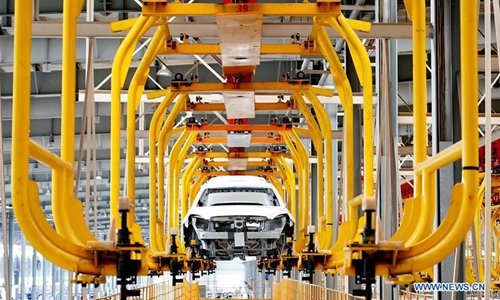China’s PMI picks up in June amid steady recovery, but pressure remains
Source:Global Times Published: 2020/6/30 10:48:40

China's manufacturing PMI Photo: Xinhua
With the orderly progress of virus prevention and control and the resumption of production and work in China, the manufacturing industry has seen a steady recovery in June, with the manufacturing purchasing managers index (PMI) and non-manufacturing business activity index rising in the month. But the global pandemic situation continues to impact China's economic operation.According to a report released by the National Bureau of Statistics (NBS) on Tuesday, China's manufacturing PMI came in at 50.9 percent in June, up 0.3 percentage points from the previous month.
The report was based on a survey of 21 sectors, in which 14 were above the critical point, up five from the previous month, with manufacturing steadily recovering and fundamentals continuing to improve.
The composite PMI output index came in at 54.2 percent in June, up 0.8 percentage points from the previous month, indicating continued improvement in Chinese enterprises' production operations.
Tang Jianwei, chief macro analyst at the Financial Research Center of the Bank of Communications, told the Global Times on Tuesday that the business recovery under a big push for production resumption contributed to the increase in PMI.
"The policy of maintaining steady growth focused on supporting 'new infrastructure,' which helped to improve the demand of related manufacturing industries, and the order index for general equipment, electrical machinery and other industries increased significantly," Tang said.
The production index and new order index was 53.9 percent and 51.4 percent respectively, up 0.7 and 0.5 percentage points from the previous month, with the new order index rising for the second consecutive month, the report showed.
From an industrial perspective, the new order and production indexes for pharmaceuticals, nonferrous metals, electrical and mechanical equipment and other manufacturing industries are all significantly higher than last month, suggesting market demand has improved and the production momentum of enterprises has strengthened.
The June purchasing price and factory gate price indexes for major raw materials were 56.8 and 52.4 percent respectively, up 5.2 and 3.7 percentage points from May, both high for the year.
As major economies around the world have begun restarting, the import and export index for China's manufacturing industry has also recovered from its low level.
The index for new export orders was 42.6 percent, 7.3 percentage points higher than the previous month, the report said.
The basic stability of business confidence is also one of the main factors that contributed to the rise in the PMI. The production and business activity index reading, although falling slightly, still reached 57.5 percent, indicating manufacturers are more optimistic about market recovery in the near future, analysts said.
While both the manufacturing PMI and the non-manufacturing PMI picked up in June, uncertainties remain.
Although the import and export index has improved for two consecutive months, it is still below the critical point, the Global Times has learned.
The global epidemic situation and the extent of external demand recovery will have an impact on China's economic operation, analysts said.
Weak external demand led to a new export order index of 42.6 percent and an import index of 47 percent, both below the dry line, and both imports and exports are expected to continue negative growth, according to Tang.
Meanwhile, recovery in some service industries is slow under pressure.
Liu Xuezhi, a macroeconomics expert from the Bank of Communications, told the Global Times on Tuesday that the business activity index for culture, sports, entertainment and residential services was below the dry line, while consumer services such as tourism, catering and accommodation have not yet recovered.
"Small enterprises are facing great difficulties in production and operations, with the PMI of small enterprises coming in at 48.9 percent, down 1.9 percentage points from the previous month," said Liu.
Analysts said that the implementation of various preferential fiscal and financial policies needs to be accelerated to support small and micro businesses in overcoming difficulties and stabilize existing jobs.
Posted in: INDUSTRIES,ECONOMY